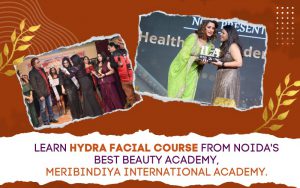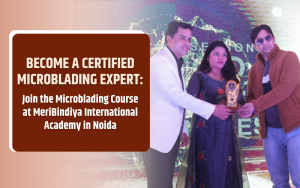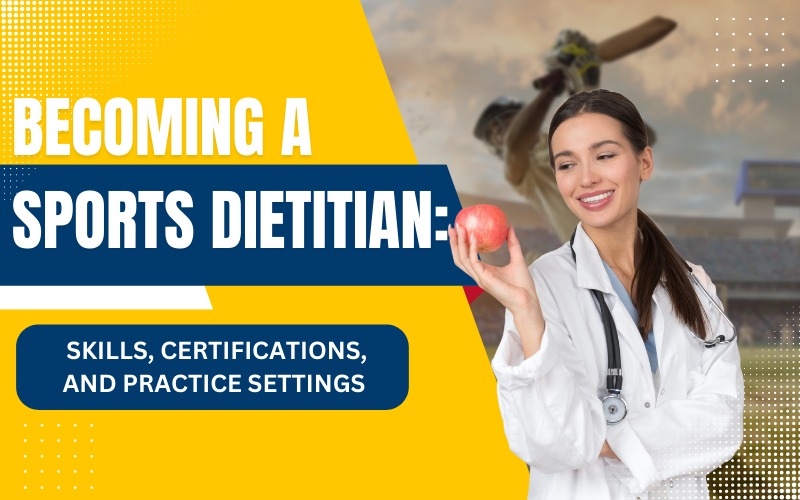Do you have a strong enthusiasm for sports and physical health? Do you take pleasure in assisting others with their diet and fitness plans? If you are passionate about nutrition and working with dynamic individuals, becoming a sports dietitian is a fulfilling and rewarding career. As a sports dietitian, you will work with different types of people, from amateurs to professional athletes. You can enroll in a reputed academy that provides diet and sports nutrition courses.

A sports dietitian is a registered dietitian who specializes in providing individualized nutrition and lifestyle advice for athletes and active individuals. They are qualified to provide in-depth knowledge about sports nutrition, body composition, ergogenic aids, hydration, and other areas related to nutrition and exercise.
Sports dietitians help athletes and active individuals to properly fuel and hydrate, optimize recovery, maintain a healthy weight, maximize performance, and prevent dietary injuries. They possess dietetics and nutrition certification.
Becoming a Sports Dietitian
Becoming a sports dietitian involves completing a relevant tertiary education in dietetics, nutrition, or food science, followed by a postgraduate qualification in sports nutrition. The field of sports nutrition is rapidly expanding and includes a variety of specializations.
To qualify for licensure or certification, aspiring sports dietitians must obtain a certificate in Diploma in dietetics and nutrition, pass an exam, and meet continuing education requirements. A master’s degree in sports nutrition is typically recommended for those wanting to specialize in this field. Once qualified, dietitians can work in competitive and recreational sports teams, exercise and fitness centers, and nutrition counseling centers.
Web: हेयर ड्रेसर के क्षेत्र में महिलाएं इस तरह से बनाएं करियर और महीने के कमाएं लाखों रुपए
Skills Needed to Become a Sports Dietitian
- Knowledge of nutrition and exercise science.
- Proficiency in breaking down and interpreting nutritional data.
- Knowledge of sports and nutrition science.
- Understanding energy balance and hydration guidelines for athletes.
- Ability to assess body composition.
- Interpersonal skills to communicate with athletes and coaches.
- Time management and organizational skills.
- Creative problem-solving.
- Detail-oriented.
- Ability to work collaboratively with a team of health professionals.
- Completion of post-secondary education in dietetics, nutrition, or a related field.
- Certification from the Academy of Nutrition and Dietetics or another nationally-recognized credentialing body.
What are the Certifications needed to become a Sports Dietitian in India?
Individuals typically need to have a degree in nutrition and dietetics and a diploma or degree in sports nutrition to practice as a sports dietitian.
Becoming certified by any recognized national or international professional association dealing with sports nutrition is also beneficial. You can also consider taking a professional nutrition and dietetics course from a reputed academy like MeriBindiya International Academy.
MeriBindiya International Academy’s Diploma in Nutrition and Dietetics Courses
Our Diploma in Nutrition and Dietetics Courses include four modules. Module 1 covers the basic concepts of food, nutrition, and health, breaking down into carbohydrates and water, proteins and lipids, and vitamins and minerals. It then moves on to the primary food groups, such as cereals, carbohydrates and water, milk and its products, Meat and its products, Pulse and legumes, green leafy and other vegetables, fruits, fats, and oils. All of these components are essential to a healthy diet and lifestyle.
Module 2 introduces the basic concepts of nutrition and nutritional assessment. This module covers anthropometric (body measurements), biochemical (chemical substances in the body), and clinical parameters (health-related symptoms). Dietary assessment and the calculation of calories are also discussed. The Harris-Benedict formula for basal energy is part of this module, as is the equation and factors to estimate an individual’s actual energy expenditure. The equations for predicting basal metabolic rate (BMR) in adults and the thermic effect of food (TEE) are also addressed.
Module 3 of Anatomy and Physiology deals with the basic unit of life and process. This includes Cells, Tissues, Organs, and Systems. Some of the systems addressed include the Gastrointestinal System, Excretory System, Integumentary System, Musculoskeletal System, Reproductive System, Respiratory System, Cardiovascular System, and Endocrine System. Additionally, information on the Skin and its derivatives is discussed within the Integumentary System.
Module 4 is dedicated to Dietetics and Nutrition Through Life Cycle. To begin with, it covers the Definition & Recommended Dietary Allowance (RDA). It provides an overall idea about the fundamentals of Meal Planning and the nutrition requisite in various life cycle stages like Infancy, Childhood, Elderly Adolescence, Adulthood, Pregnancy, and Lactation. The module also covers topics like Principles of Meal Planning and Meal Planning for adults. Furthermore, it discusses the specifics of Meal Planning for pregnant women and lactating women, as well as for school children and adolescents.
Practice Settings of a Sports Dietitian
Private Practice
Working as a sports dietitian in a private practice setting allows excellent flexibility and control over the services provided. Dietitians may specialize in sports nutrition, set their pricing, and take on clients individually.
Consultation
Sports dietitians typically work with teams or individual athletes in a one-on-one environment. The dietitian will assess the athlete’s food intake, create tailored nutrition plans, and evaluate outcomes in this setting.
Hospital/Clinic
Many dietitians work in inpatient or outpatient settings within a hospital or clinic. Here they will provide medical nutrition therapy to the players recovering from surgery or illness, as well as provide nutrition education and assist with meal planning for medical conditions.
Public/Community Health
Sports dietitians can often be found in public or community health settings providing nutrition education and promoting health and wellness. They may also offer counseling to needy individuals and provide structured nutrition plans for large groups.
Educator/Researcher
This setting is for those passionate about nutrition research. Dietitians can pursue an education in sports nutrition and become involved in research labs and clinical studies to further their knowledge.
Wrap Up
Becoming a Sports Dietitian is a gratifying career requiring much education and hard work. It requires an understanding of nutrition and a passion for helping athletes reach their full potential. Becoming a Sports Dietitian also involves counseling athletes on their eating habits and helping them develop the nutritional strategies necessary to achieve their goals. Suppose you are passionate about sports nutrition and have the drive and dedication to create effective nutrition plans. In that case, becoming a Sports Dietitian is an excellent career choice for you.
If you are passionate about having a career in beauty industry and are looking forward to enroll in a professional beauty courses that include makeup, nail art, cosmetology, hair stylist, hair dresser, micro blading and much more get in touch with MeriBindiya International Academy. Enroll in our beauty courses that best suits your interest and kickstart your career in the beauty industry.
For more details
Call/ Whats App Number: ☎ 8130520472
You can also visit our website: www.meribindiya.com
Feel free to drop in at our branches located in Noida and Delhi
Noida Branch: Shop No – 1, 2nd & 3rd Floor, Sunehri Market Atta, Near Sector 18 Metro Station, Sector 27, Noida, Uttar Pradesh, Pincode: 201301.
Delhi Branch: A6, Vishal Enclave, Rajouri Garden, Opp. Metro Pillar No. 410, Najafgarh Road, New Delhi, Pincode: 110027.































